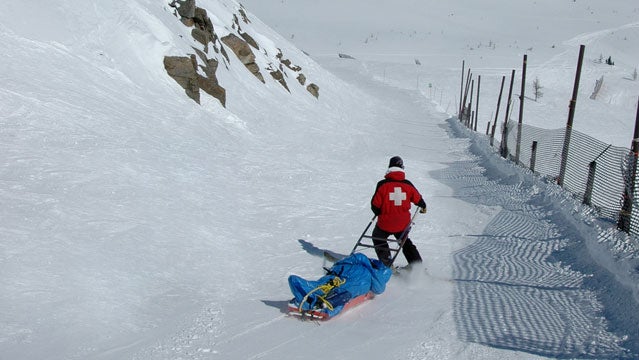It’s easy enough to sign up for ski-patrol training and qualifying courses—provided you live near a resort mountain. The hard part: actually passing the test and earning the privilege of wearing one of those cool red jackets. Here’s how to make that happen.
EXPECT TO MAKE TENS OF DOLLARS
You won’t get rich ski-patrolling, and in many cases, it’s a volunteer position. It has its perks, though, like making first tracks on the mountain in the morning, cutting in front of everyone in the lift line, and, you know, saving lives.
MAKE SURE YOUR CPR CERTIFICATION IS UP TO DATE
CPR certification lasts for two years. If yours has expired, contact the American Heart Association in order to locate the nearest review course, so you can get it renewed. You won’t even be considered for ski patrol without it.
JOIN THE NATIONAL SKI PATROL
The 75-year-old NSP is the official professional organization for ski patrols in the U.S. It certifies patrollers and provides education and training for its members. Most importantly, if you pay the $70 annual dues to join, the cost to enroll in ski-patrol classes at your local resort will usually be discounted. The organization, created by Charles Minot Dole, the founder of the Army’s 10th Mountain Division, includes 28,000 members from 650 patrols.
CONTACT THE PATROL AT YOUR LOCAL RESORT
The expectations and qualifications for ski patrol members vary quite a bit at each mountain. You’ll need to be a decent skier or snowboarder, but not necessarily the second coming of Lindsey Vonn. The baseline qualifying course you’ll be expected to take is Outdoor Emergency Care. It’s administered by the NSP, focuses on medical training, and is usually given in the fall, one night a week for two or three months. If you pass the exam at the end of the course, some smaller resorts will consider you nearly fully qualified to become a patroller. Others—where the conditions and terrain are more dangerous and unpredictable—have more rigorous standards. Squaw Valley, for example, expects you to train for two years as a candidate before you can officially become a ski-patrol member.


